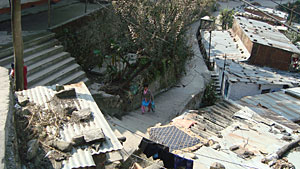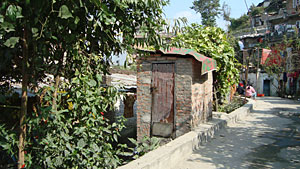 RUBEENA MAHATO |
Inside a cramped room in Balaju, Kathmandu, a group of women are poring over some papers. Oblivious to the noise outside and people bustling about in the tiny room, they are engrossed in checking and rechecking figures. Fifty, two hundred, thousand, they murmur in a low voice as they carefully record the numbers in ledgers.
This is the one-roomed office of the Pragati Women's Cooperative, run by women from slums and squatter communities, and it is their hard-earned monthly savings that they are so meticulously noting down.
It's hard to believe that the savings that started with Rs 1 a month now total Rs 10.5 million. The women who helped raise this money, working as construction workers and household help in the city, beam with pride as they mention these numbers.
"Why wouldn't we be proud? These savings are our blood and sweat. When you live in a 'basti' nobody trusts you even for a loan of ten rupees. But this cooperative has made us millionares,"says their 70-year-old president, Kumari Singh Khadka. Thanks to the cooperative, landless women who lack any collateral can take out small loans to pay medical bills, cover tuition for their children, and invest in small businesses without any hassle.
 |
Although the cooperative was initially meant to provide savings and credit facilities to women, it also started to mobilise its members to improve the living conditions in the slums. The result is that most members have constructed toilets using loans, the settlements are cleaner, and almost all children go to school. The cooperative also runs health camps, offers tuition for children in the slums, and spreads awareness about hygiene and sanitation.
The cooperative's role in improving slum conditions has also had a direct bearing on reducing the stigma against squatters. "City dwellers did not even let their dogs come to our area," Kumari Singh Khadka remembers. "Now they come to us to seek our advice on how to improve community amenities."
But it is the cooperative's role in empowering disadvantaged women that has had the most profound effect. Most women who work in the cooperative have little or no formal education but manage their money down to the last paisa. Their accounts are so immaculate that the government officials who came to check up on them some months ago returned praising the women and advising them to purchase a computer.
"It would definitely be better if the government did not put us in the same league as profit-making companies. The government has never done anything for people like us, but at least it could offer us tax cuts," says Khadka, who coordinates 29 other cooperatives like Pragati run by squatter women in Kathmandu. There are now about 10,000 members in the cooperatives set up by Lumanti for squatters and slum dwellers in Nepal, with total savings of close to Rs 30.5 million.
Model slum
|
In spite of the flashy malls and high rises across Kathmandu, the slums that sprawl along the Valley's rivers remind us of the ugly face of urban poverty. But the government's response has been one of indifference. Lajana Manandhar of Lumanti knows this well. "There is a distorted image of poverty amongst the government, policymakers and donors. Only rural poverty gets any attention here. But the government cannot shrug off its responsibility to address the needs of squatters," she says.
Lumanti has taken the initiative where government has failed. To show that slums too can be made habitable and their inhabitants be supported in improving their living conditions, Lumanti decided to develop Narayan Tole, a squatter settlement below Maharajganj. Four years ago, the 31-house settlement perched atop steep slopes above the foetid Samakhusi stream, and faced yearly risks of flooding and landslides. The paths were so steep one had to crawl on all fours at times. Diseases like diarrhoea, typhoid and hepatitis were common. "I fell ill due to hepatitis after I came to live here and then I found that almost every family had someone suffering from the disease," Arjun Thapa remembers.
|
The houses of Narayan Tole still give the impression of tin matchboxes but now flowers and plants line the paved lanes, and stone slabs cover the stream running through the middle of the settlement. There are toilets in all the houses. Walls have been constructed to contain mudslides. There is clean piped water available to the residents and there's even a sewage treatment facility that purifies the settlement's waste before it is discharged into the stream. Unsurprisingly, the incidence of water-borne diseases has declined.
 |
Right after the slum ends, however, imposing houses discharge untreated sewage directly into the stream. "Talk about who's polluting the river now," exclaims Bhairaja Gautum, vice chairman of the Narayan Tole Improvement Committee.
READ ALSO:
Red alert, PRABHAT BHATTARAI
Kathmandu's malignant urban tumour, MAARTEN POST




